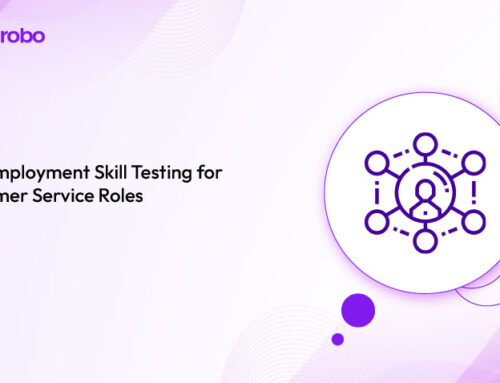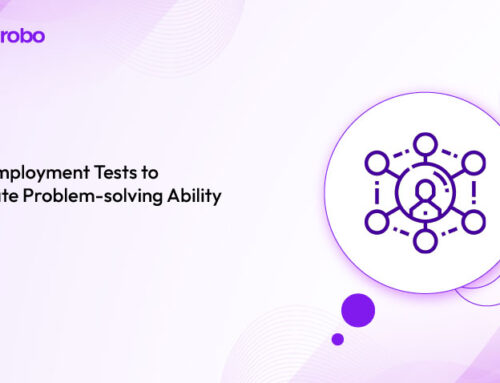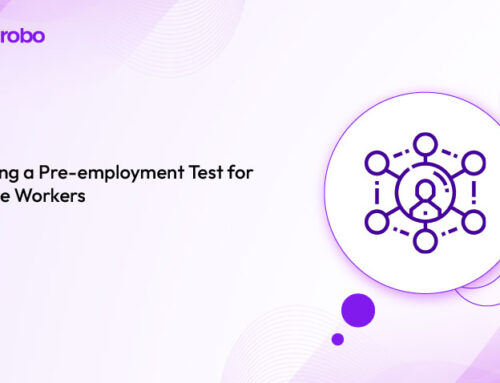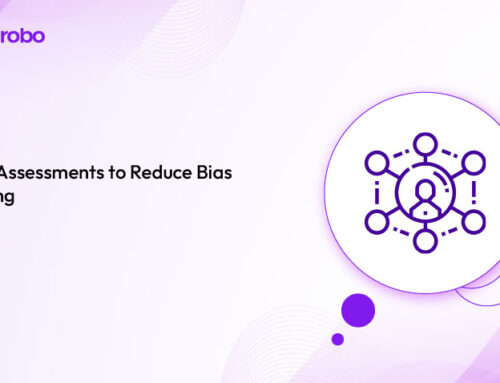
Key Takeaways
- Pre-employment skills tests objectively measure real-world capabilities, helping companies make better, more informed hiring decisions.
- These tests minimize over-reliance on resumes and interviews by uncovering top performers early in the hiring funnel.
- Skills-based hiring improves productivity, increases employee retention rates, and strengthens diversity and inclusion efforts.
- Platforms like Skillrobo offer customizable and secure skill assessments that streamline hiring processes and enhance recruitment outcomes.
Why Skills-Based Hiring is Changing Recruitment
Traditional hiring practices often prioritize resumes and interviews—but in today’s competitive market, that’s not enough. Employers need candidates who can deliver results, not just talk about them. A pre-employment skills test validates whether applicants truly have the competencies they claim. Especially in a world where 78% of job seekers embellish resumes, skills testing ensures you assess real ability—not just good storytelling.
In this blog, we explore the true power of pre-employment testing and why modern companies can’t afford to skip it.
What is a Pre-Employment Skills Test?
A pre-employment skills test is a structured evaluation conducted during hiring to objectively measure a candidate’s capabilities for a specific role. It moves beyond resumes and interviews to assess real-world job readiness.
These assessments typically measure:
1. Technical skills
Such as Excel expertise, coding proficiency, writing ability, or financial knowledge.Such as expertise in Microsoft Excel for data management, proficiency in coding languages like Python or Java, strong writing skills for communication tasks
2. Cognitive skills
Including logical reasoning, analytical thinking, and numerical aptitude. Companies increasingly use cognitive tests to predict candidate success in complex roles.
3. Behavioral traits
Such as emotional intelligence, adaptability, teamwork, and leadership potential. Accurate personality trait identification helps ensure better cultural fit and lowers turnover.
By combining different types of tests, companies can create a complete, unbiased profile of each candidate. This approach aligns with the need for fair, skills-based hiring and addresses challenges like unfair hiring practices that can hinder diversity and inclusion.
Types of Pre-Employment Skills Tests
Today’s recruitment workflows often use multiple types of skills tests together. As hiring becomes more competitive and skills-focused, companies realize that no single test can fully capture a candidate’s potential. Instead, combining different types of pre-employment skills tests—technical, cognitive, behavioral, and situational—provides a holistic view of each applicant. Here’s a detailed breakdown:
1. Technical Skills Tests
These assessments validate job-specific abilities. Whether it’s Excel tasks for an operations analyst, coding challenges for software engineers, or writing samples for content roles, technical skills testing ensures candidates can perform essential functions. Using a platform like Skillrobo’s online assessment software helps streamline this step securely and efficiently.
2. Cognitive Ability Tests
Cognitive tests assess candidates’ capacity to process information, solve problems, and think logically—skills that are vital for fast-paced, analytical roles. For deeper insight, recruiters can explore different types of cognitive tests designed to measure reasoning and learning potential.
3. Behavioral and Personality Tests
Understand how a candidate collaborates, communicates, and fits within a team. Behavioral assessments help recruiters spot traits like emotional intelligence or resilience. Recruiters looking to build high-performing, cohesive teams often use tools to identify personality traits and align them with organizational values. This approach prevents costly mismatches that contribute to poor retention and turnover. Behavioral evaluations also reduce unconscious bias in hiring by focusing on measurable traits rather than assumptions based on resumes or interviews.
4. Situational Judgement Tests (SJT)
Situational Judgement Tests present candidates with real-world, job-related scenarios and ask them how they would respond. These tests are particularly effective for assessing decision-making skills, conflict resolution, leadership capabilities, and customer-handling abilities. If you’re designing hiring processes for leadership or client-facing roles, SJTs should be part of your pre-employment skills testing strategy. To maintain fairness, it’s important to pair SJTs with broader strategies like those described in the types of assessments to organize hiring processes.
Why Pre-Employment Skills Tests Matter More Than Ever
With the surge in remote hiring and hybrid work models—companies can no longer rely solely on gut feelings or polished resumes. Talent competition is fierce, and the cost of a bad hire is higher than ever. This is where structured pre-employment skills tests become indispensable.
Pre-employment assessments bring objectivity into the hiring process, ensuring that hiring decisions are based on real capabilities rather than assumptions or biases. Here’s why skill assessments have become a must-have:
1. Objective Data
Hiring decisions are made based on verifiable performance metrics, not intuition or unconscious bias.
2. Faster Shortlisting
Automated scoring and data-driven insights accelerate the selection process, helping companies fill roles quickly.
3. Improved Retention
Employees hired based on actual skills are more likely to succeed, feel confident in their roles, and stay longer.
Poor hiring decisions can cost companies up to 30% of the employee’s first-year earnings. Implementing skill assessments early prevents costly mistakes and supports fair hiring practices, helping companies avoid risks like unfair hiring practices.
Challenges Without Skills Assessments
Without structured skills assessments in place, companies are exposed to several risks that can derail the hiring process:
1. Over-reliance on Subjective Interviews
Traditional interviews often assess how well a candidate can communicate or build rapport, rather than their actual job skills. This leads to hiring decisions based more on personality impressions than proven ability, increasing the risk of poor performance later on.
2. Increased Chances of Favoritism or Unconscious Bias
When recruitment decisions rely purely on gut feeling or intuition, favoritism at work can easily creep in, whether intentional or not. This damages team morale, reduces employee trust in leadership and ultimately leads to higher attrition.
3. Difficulty Comparing Candidates Objectively
Without standardized skills assessments, recruiters often end up comparing candidates based on subjective impressions rather than measurable competencies. This inconsistency makes it harder to justify hiring decisions, especially when candidates have similar backgrounds or experience levels.
4. Higher Onboarding and Training Costs
Bringing on an employee who lacks the necessary skills forces companies to spend additional time and money on onboarding and extensive training. This not only delays productivity but also increases the risk of early turnover if the employee struggles to meet role expectations.
Additionally, issues like favoritism at work can creep in when hiring decisions are not grounded in data.
How Skill-Based Hiring Improves Workplace Diversity
Skill-based hiring is not just good for filling positions faster—it’s crucial for improving workplace diversity and inclusion. By focusing on what candidates can do rather than where they come from, companies unlock wider and more diverse talent pools.
- Candidates without prestigious degrees or traditional career paths get a fair shot.
- Gaps in resumes, which often disproportionately affect women and minority groups, become less of a hurdle.
- Candidates are evaluated on real-world competencies, not outdated credentials.
Research shows that skills-first hiring improves not only diversity but also innovation and business performance. Teams built on varied experiences and skill sets consistently outperform those built on traditional, resume-driven hiring methods.
Using structured assessments early in the hiring process ensures that every applicant—regardless of background—has an equal opportunity to succeed.
Common Skills Measured in Pre-Employment Tests
Today’s employers measure a wide range of skills to ensure the best fit for each role. Here’s a breakdown of some of the most commonly tested skill categories:
| Skill Type | Examples |
|---|---|
| Technical | Excel, coding, accounting |
| Communication | Writing, email etiquette, negotiation |
| Cognitive | Problem-solving, critical thinking |
| Behavioral | Teamwork, leadership potential |
1. Technical Skills – Tests like Excel assessment tests and coding tests validate if candidates can actually perform on the job, instead of just listing skills on a resume.
2. Communication Skills – Strong writing, email etiquette, and negotiation are vital, especially for roles that require customer interaction.
3. Cognitive Ability – Measuring how candidates think, solve problems, and make decisions is critical. Explore more about these cognitive tests and why they matter in hiring.
4. Behavioral Skills – Traits like teamwork, leadership potential, and adaptability are often evaluated through behavioral assessments and structured call center assessment tests for customer-facing roles.
Benefits of Pre-Employment Skills Testing
Implementing pre-employment skills tests into your hiring process isn’t just a smart move—it’s a strategic advantage.
Here’s how structured assessments make recruitment faster, fairer, and more effective:
1. Reduces Hiring Risks
Skills assessments act as the first line of defense against poor hiring choices.
Rather than relying on resumes—which are often embellished—employers can validate actual, job-relevant skills. Candidates who perform well in tests are more likely to excel on the job, minimizing risks of early attrition and underperformance.
2. Increases Hiring Speed
Speed is crucial in today’s competitive job market. Platforms like Skillrobo’s online examination system enable recruiters to quickly administer tests, automate scoring, and shortlist top candidates—all without manual effort.
Automated assessments help you move qualified candidates through the pipeline faster, saving time and resources.
3. Enhances Fairness
Bias in hiring—whether unconscious or systemic—is a major challenge today. Skills tests level the playing field by offering every candidate the same standardized evaluation. By removing subjective judgment early in the hiring funnel, organizations can build credibility and promote fairness—an essential step towards inclusive hiring practices.
4. Improves Team Performance
Teams composed of employees hired based on proven skills perform better collectively. New hires onboard faster, contribute sooner and adapt more effectively to changing work environments. Ultimately, skills-based hiring leads to stronger, more resilient teams that drive organizational success.
How Skillrobo Empowers Smarter Hiring
When it comes to skill-based hiring, having the right platform makes all the difference. Skillrobo streamlines the entire assessment process by combining flexibility, security, and speed—all on a single platform.
Here’s what you get with Skillrobo:
1. 100+ Pre-Built Tests – Covering a wide range of technical, cognitive, and behavioral skills—ready to deploy instantly.
2. Custom Test Creation – Tailor assessments to fit your specific job roles, whether you’re hiring for sales, tech, operations, or creative functions.
3. Secure, AI-Monitored Test Environment – Ensure fairness and test integrity with Skillrobo’s intelligent proctoring tools.
4. Instant, Detailed Reporting – Quickly view candidate performance, skill gaps, and strengths through easy-to-read analytics dashboards.
Whether you’re hiring a marketer, developer, or admin assistant, Skillrobo helps you confidently shortlist truly job-ready candidates. Plus, if you’re evaluating candidates for creative or communication-heavy roles, Skillrobo’s specialized communication skills assessments ensure you’re hiring professionals who can write, speak, and collaborate effectively.
Conclusion: Future-Proof Your Hiring with Skills Testing
Skills—not just resumes or interviews—predict workplace success. Relying solely on education history or polished interviews often leads to costly hiring mistakes. Pre-employment skills tests provide a smarter, data-driven way to evaluate candidates based on real capabilities, helping organizations build stronger, more resilient teams.
By incorporating structured skill assessments into your recruitment process, you ensure that every hire is based on proven ability, not assumptions or biases. This approach not only improves job performance and retention but also strengthens your employer brand by demonstrating a commitment to fair and merit-based hiring. If you’re ready to eliminate guesswork and future-proof your hiring strategies, it’s time to leverage skills testing.
Explore Skillrobo today and discover how customizable, secure pre-employment assessments can help you attract, evaluate, and onboard top talent with confidence. Sign up now!
Frequently Asked Questions
1. What is a pre-employment skills test?
A pre-employment skills test is an assessment used during hiring to objectively measure a candidate’s job-specific abilities. It helps employers evaluate real-world competencies instead of relying solely on resumes or interviews.
2. Why are pre-employment skills tests important in hiring?
Skills tests ensure hiring decisions are based on proven ability rather than assumptions. They reduce hiring risks, speed up the recruitment process, and improve employee performance and retention.
3. What types of skills can be evaluated through pre-employment tests?
You can assess technical skills (like Excel or coding), cognitive skills (like problem-solving), communication skills, and behavioral traits such as teamwork and leadership potential.
4. How do skills tests help reduce hiring bias?
Since every candidate takes the same standardized test, pre-employment assessments reduce unconscious bias and favoritism, ensuring fairer and more objective hiring outcomes.
5. How does Skillrobo make pre-employment testing easier?
Skillrobo offers customizable skill assessments, secure online testing environments, instant reporting, and integrations with ATS platforms—helping recruiters streamline hiring and make data-driven decisions.









